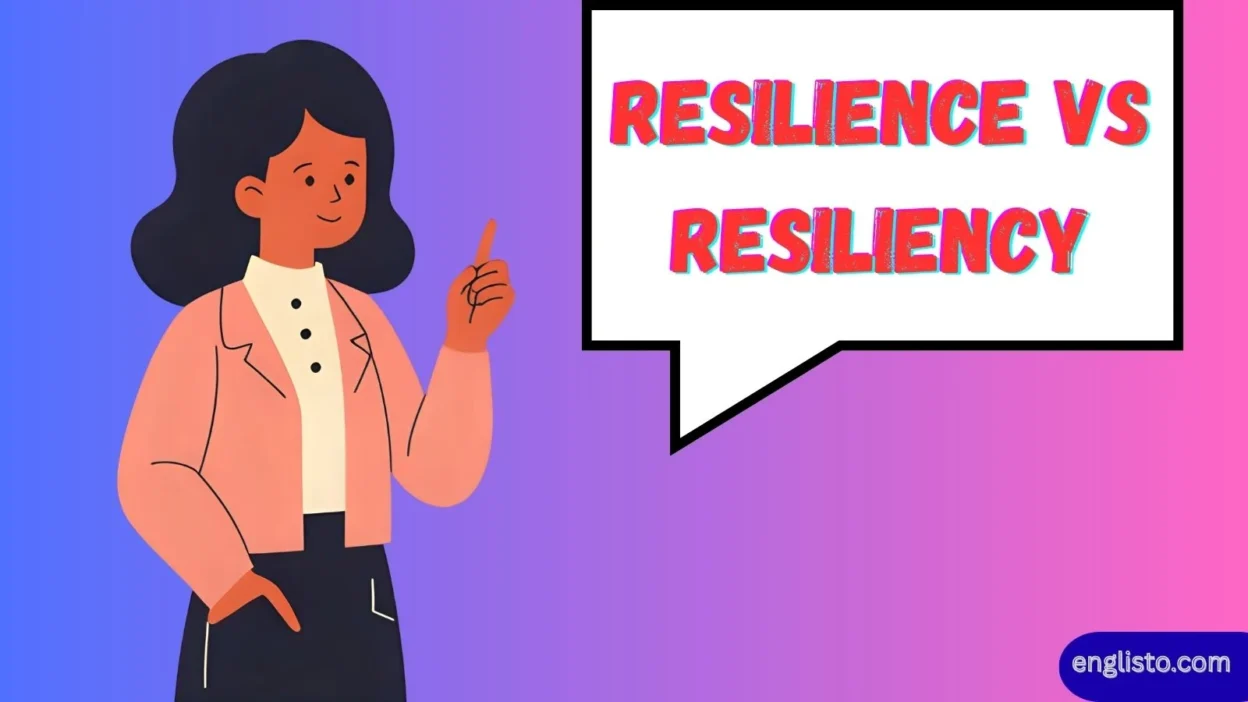Language often hides subtle distinctions that can spark curiosity, debate, and sometimes confusion. A perfect example is the word pair “resilience” and “resiliency.” Both appear in literature, psychology, business, and even everyday conversations. At first glance, they seem interchangeable, but history, usage, and style show us that each carries slightly different nuances. Resilience vs Resiliency.
In this in-depth guide, we’ll explore the origins, usage trends, and real-life applications of resilience vs. resiliency. Along the way, we’ll look at grammar, synonyms, psychological meaning, cultural preferences, and why one term has taken center stage while the other remains in the shadows. By the end, you’ll know not just which word to use, but also how to use it effectively depending on your audience and context.
The Origins: Tracing the Roots of Resilience and Resiliency
Words often carry the weight of history. To understand the difference, let’s start with etymology.
- Both resilience and resiliency trace back to the Latin word “resilire”, meaning “to rebound” or “to recoil.”
- The noun resilience appeared first in English. Its earliest recorded use dates back to 1626 in Sir Francis Bacon’s Sylva Sylvarum.
- Resiliency followed a bit later, first appearing in works such as J.A. Comenius’s Natural Philosophy Reformed (1651).
Interestingly, during the 17th–19th centuries, both words circulated in British and American publications. However, by the late 19th century, resilience prevailed by a significant margin in both academic and everyday writing.
| Word | First Appearance | Etymology | Notes |
| Resilience | 1626 (Francis Bacon) | From resilire (rebound, recoil) | Became the standard term |
| Resiliency | 1651 (J.A. Comenius) | Variant of resilience | Less common, seen more in North America |
Read More: How to Use Ellipses in a Sentence: A Complete Guide to Mastering the Three Dots
Usage in Modern English: Standard vs. Variant
In contemporary writing, resilience is the widely accepted standard, while resiliency is treated as a variant form.
- Resilience is more common in academic, psychological, and general contexts.
- Resiliency still pops up, especially in North American publications, but it’s often viewed as either old-fashioned or unnecessarily verbose.
Take a look at this comparison:
| Context | Preferred Term | Example Sentence |
| Academic research | Resilience | “The study examined the resilience of at-risk teenagers facing economic hardship.” |
| Everyday conversation | Resilience | “Jane showed incredible resilience after losing her job.” |
| Engineering/technical writing | Either | “The material’s resiliency allows it to absorb energy without breaking.” |
| Branding/marketing | Resiliency (sometimes) | “Our product is built on resiliency and innovation.” |
So while both words are correct, resilience is the safer choice—especially if you want to avoid criticism from editors, professors, or grammar purists.
Grammar and Style: Why Writers Prefer Resilience
From a stylistic standpoint, resilience feels cleaner, shorter, and more direct. With just three syllables compared to resiliency’s four, it avoids what linguists call verbosity or pretentiousness.
Here’s a quick comparison table:
| Feature | Resilience | Resiliency |
| Syllables | 3 (re-sil-ence) | 4 (re-sil-i-en-cy) |
| Sound | Crisp, succinct | Longer, more formal |
| Style | Preferred, modern | Less common, sometimes awkward |
| Tone | Natural, strong | Can sound technical or dated |
In short: brevity wins. Just as we prefer potency over potence or sufficiency over sufficience, so too has resilience edged out resiliency.
Psychological and Emotional Contexts
When people talk about bouncing back from trauma, setbacks, or adversity, they almost always use resilience. It’s a word loaded with positive connotations—strength, endurance, and the human capacity to adapt.
Examples:
- A sports team defending its title after a crushing loss demonstrates resilience.
- A company recovering from surprising stock mismanagement reflects resilience.
- An individual coping with illness, injury, or personal failure embodies resilience.
In psychology, resilience is even described as a “key trait of highly sought-after individuals”—those who can endure challenges, learn from mistakes, and still thrive.
Real-Life Applications: Where Each Word Appears
To see how these words live in the real world, let’s break it down by domain.
Everyday Life
- Correct usage: “Tom showed resilience during his public speaking presentation.”
- Incorrect/awkward usage: “Tom showed resiliency during his public speaking presentation.”
Business and Economics
- During economic downturns, resilient companies adapt through innovative strategies.
- Reports sometimes use resiliency in technical contexts, but resilience dominates annual reports and leadership books.
Science and Engineering
- Materials science often uses resiliency when describing the ability of structures to absorb energy and deform without breaking.
- Example: “This alloy demonstrates high resiliency under stress.”
Nature and Environment
- Plants, animals, and ecosystems are praised for their resilience—their ability to survive harsh conditions.
Synonyms and Related Word Pairs
One way to see the difference is to compare other noun pairs that end in -ence and -ency. Linguists have identified over 190 such word pairs in the Oxford English Dictionary. Some sound natural, others feel clunky.
| Word Pair | Preferred Form | Less Common Variant |
| Abstinence / Abstinency | Abstinence | Abstinency |
| Emergence / Emergency | Emergency (different meaning) | — |
| Potency / Potence | Potency | Potence |
| Resilience / Resiliency | Resilience | Resiliency |
| Sufficiency / Sufficience | Sufficiency | Sufficience |
| Virulence / Virulency | Virulence | Virulency |
This pattern shows us that English tends to favor -ence endings for smoother, more natural usage.
Cultural and Regional Preferences
The divide between resilience and resiliency often reflects regional English variations.
- In the USA and Canada, resiliency occasionally appears in professional or technical writing.
- In British English and most non-North American regions, resilience is the dominant form.
For global communication, resilience is the safer choice—just as British spelling often prevails in international academia.
Why the Distinction Matters
Some may wonder, “If both are correct, why fuss about it?” The truth is, language choice impacts clarity, professionalism, and perception.
- Using resilience signals that you value clarity and standard usage.
- Using resiliency may suggest formality, pretentiousness, or even miscommunication in certain contexts.
In branding, writing, or leadership, these subtle distinctions shape credibility.
“Words are not just tools—they’re signals of professionalism, tone, and trust.”
Writing Tips for Choosing the Right Term
- Default to resilience in writing, unless quoting a source that explicitly uses resiliency.
- Avoid resiliency in casual, motivational, or academic writing—it can feel unnecessarily verbose.
- Use resiliency in materials science or engineering contexts if it fits the technical meaning.
- Think about your audience: if they’re non-North American, resiliency may stand out as unusual.
FAQs on Resilience vs. Resiliency
Q1: Is resiliency incorrect?
No, it’s not wrong, but it’s less common. Resilience is the preferred and widely recognized form.
Q2: Do resilience and resiliency mean the same thing?
Yes, they both refer to the ability to recover, adapt, or bounce back. The difference lies in style and frequency of use.
Q3: Which word should I use in academic writing?
Always go with resilience. It’s the standard term in psychology, sociology, and other academic fields.
Q4: Why do Americans use resiliency more often?
North American publications occasionally favor it, possibly due to historical linguistic trends, but even in the U.S., resilience dominates.
Q5: Can resilience apply to materials and structures?
Yes, both resilience and resiliency are used in engineering. However, resilience is still the more accepted choice.
Conclusion: The Safer, Smarter Choice
When it comes to resilience vs. resiliency, both words share roots, meanings, and history. But usage patterns show a clear winner:
- Resilience is the standard, modern, and widely accepted term across disciplines.
- Resiliency lingers as a variant—legitimate, but less favored.
For most purposes, especially in writing and professional communication, resilience is the word you should choose. It’s concise, natural, and carries the weight of centuries of usage.
In the fast-paced world where adaptability, strength, and clarity matter, resilience not only describes what we strive for—it embodies the very language we trust.



